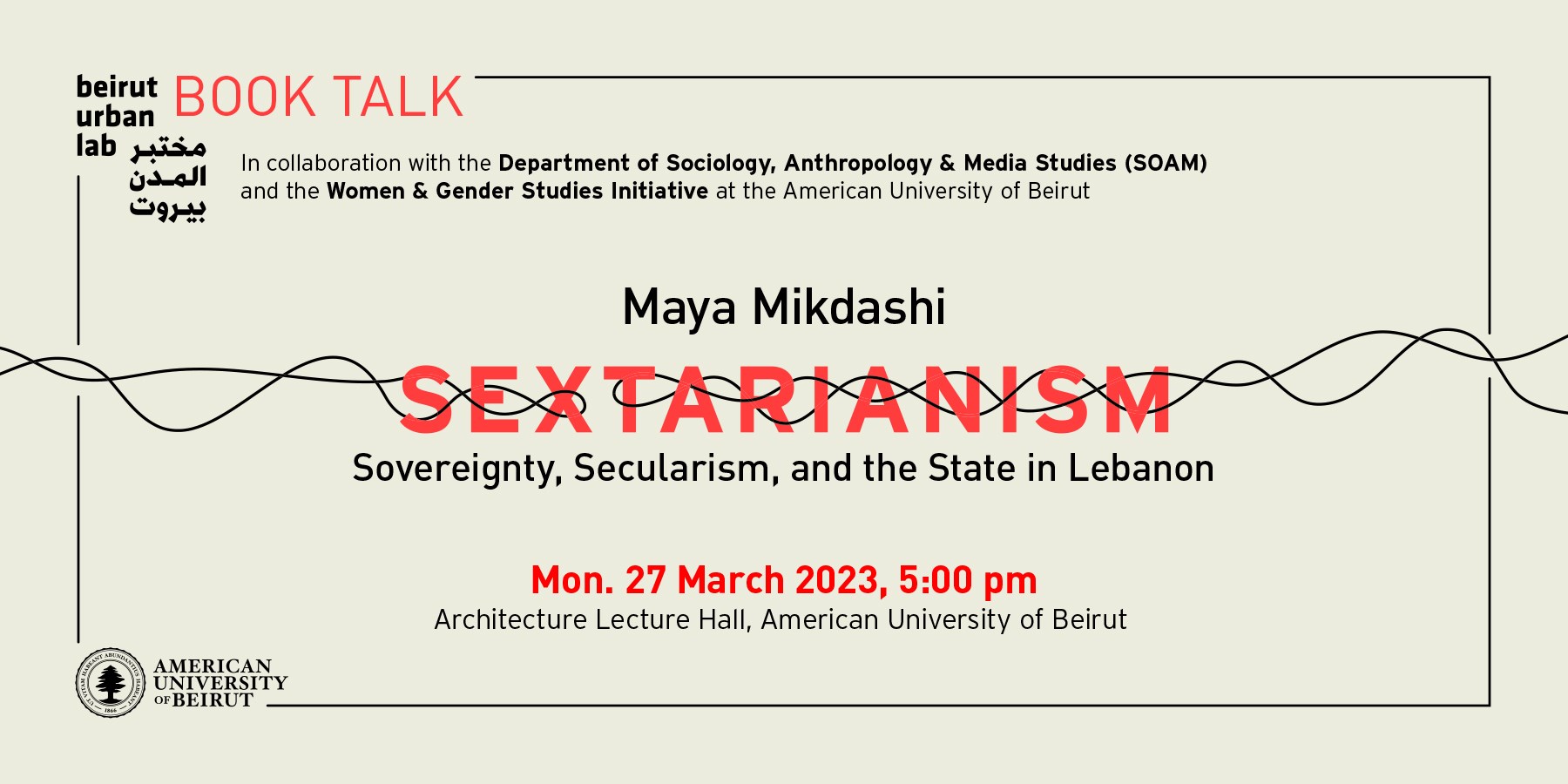Sextarianism: Sovereignty, Secularism, and the State in Lebanon

Date: Monday, March 27, 2023 at 5:00PM (daylight savings time, GMT+2)
Location: Architecture Lecture Hall, American University of Beirut
Sextarianism: Sovereignty, Secularism, and the State in Lebanon
Authored by Maya Mikdashi
Discussants:
Sara Mourad, Assistant Professor of Media Studies at the American University of Beirut
Elizabeth Saleh, Assistant Professor of Anthropology at the American University of Beirut
Jamil Mouawad, Founding Member of the Beirut School for Critical Security Studies
Moderated by:
Mona Harb, Professor of Urban Studies and Politics at AUB, Research Lead at Beirut Urban Lab
All are welcome!
Bios
Maya
Mikdashi is an Associate Professor in the Department of Women’s, Gender, and
Sexuality Studies at Rutgers University. Her first book Sextarianism: Sovereignty, Secularism
and the State in Lebanon (SUP, 2022) theorizes the
relationships between sexual difference and political difference, the religious
and the secular, and law, bureaucracy, and biopower. Her work is grounded in
ethnographic and archival research, and has been translated into Arabic, Turkish,
French, Spanish, German and Korean. Maya has been published in several
peer reviewed journals, including the
International Journal of Middle East Studies, Gay and Lesbian Quarterly, the Journal of Middle East Women's
Studies, American
Ethnologist, Transgender
Studies Quarterly, Comparative
Studies of South Asia, Africa and the Middle East, the Journal of Palestine Studies,
and the American Indian
Culture and Research Journal. She has also been published in peer
reviewed edited volumes and in public facing venues. She is a co-founding
editor of Jadaliyya,
and is a member of the editorial collectives of Comparative Studies of South Asia,
Africa and the Middle East, Middle
East Law and Governance, Agitate!,
and Social Text.
Maya is co-director of the documentary film About Baghdad (2004), filmed in
Iraq in 2003, and director of Notes on the War (2006) filmed in Lebanon in
2006. She holds degrees from the Lebanese American University, Georgetown
University, and Columbia University.
Sara Mourad is an Assistant Professor of Media Studies at the American
University of Beirut, where she also co-directs the Women & Gender Studies
Program. She received her PhD in Communication at the University of
Pennsylvania and her BA in Political Science at AUB. Sara’s work is at the
intersection of cultural studies, feminist theory, and Middle East Studies. Her
book in process, on women’s narratives in postwar Lebanese public culture,
examines novels, films, television series, and activist publications to
consider how womanhood has been constituted as an identity and how female
narrative shaped the formation of feminism as a cultural field in contemporary
Lebanon. Sara is also working on a book of essays about motherhood and the
question of time in feminism. In 2018, she was awarded a fellowship as a
Visiting Scholar at the Center for the Study of Gender and Sexuality at New
York University. Her research and writing on media and gender politics in
the Arab world is published in the
International Journal of Communication, Critical Studies in Media
Communication, the
Journal of Communication Inquiry, Jadaliyya, Legal Agenda, and Daraj.
Elizabeth Saleh is an Assistant Professor in Socio-cultural
Anthropology at the American University of Beirut. She works at the intersection
of political and economic anthropology. Her first long-term ethnographic
fieldwork was based in Lebanon’s Bekaa Valley and culminated in 2014 in her
doctoral thesis at Goldsmiths, University of London. Her PhD thesis is
entitled Trade-marking Tradition: an Ethnography of Lebanon's Wine
Industry. Elizabeth’s current ethnographic research began in 2015 and is about
the lives of underage Syrian waste pickers growing up at a small scrapyard
located in a run-down building in Beirut. The book in progress has the working
title, Junk Territory:
Coming of Age at a Beirut Scrapyard. It focuses on questions
of value pertaining to the way young waste pickers buttress, engage, and become
entangled with Beirut’s infrastructures as well as different economies of
recycling and their supply chains. The book documents how different schemas of
worth and value intersect with profit-making infrastructures, currencies of
intergenerational obligation, and the interplay between host and migrant
communities. It shows how Beirut is a city pieced together through a medley of
different enterprises and projects facilitating an equally hodgepodge provision
of public services.
Jamil Mouawad teaches politics at the American University of Beirut. He is also
a Senior Fellow at the Arab Reform Initiative. He holds a PhD in politics from
the School of Oriental and African Studies (SOAS). He is a founding member of
the Beirut School for Critical Security Studies, and the Ethics in Social
sciences initiative, both on-going projects launched by the Arab Council for
Social Sciences (ACSS). His research interests in state-society relations
span the subfields of comparative politics and political economy. He
specializes in the politics of the Middle East, with a focus on governance
and state-society relations. His has several publications that appeared
in Middle East Critique, Critique Internationale,
and Arab Studies
Journal. He is also a regular commentator on Middle East and
Lebanese Politics.
Mona Harb is a Professor of Urban Studies and Politics at the American
University of Beirut where she is also co-founder and research lead at the
Beirut Urban Lab. Her research investigates governance and territoriality in
contexts of contested sovereignty; urban activism and oppositional politics;
and how people make collective life in fragmented cities. She is the author
of Le Hezbollah à
Beirut: de la banlieue à la ville, co-author of Leisurely Islam: Negotiating Geography
and Morality in Shi’i South Beirut (with Lara Deeb), co-editor
of Local Governments and
Public Goods: Assessing Decentralization in the Arab World (with
Sami Atallah), and co-editor of Refugees
as City-Makers (with Mona Fawaz et al.). She serves on the
editorial boards of MELG, IJMES, EPC, and CSSAME.